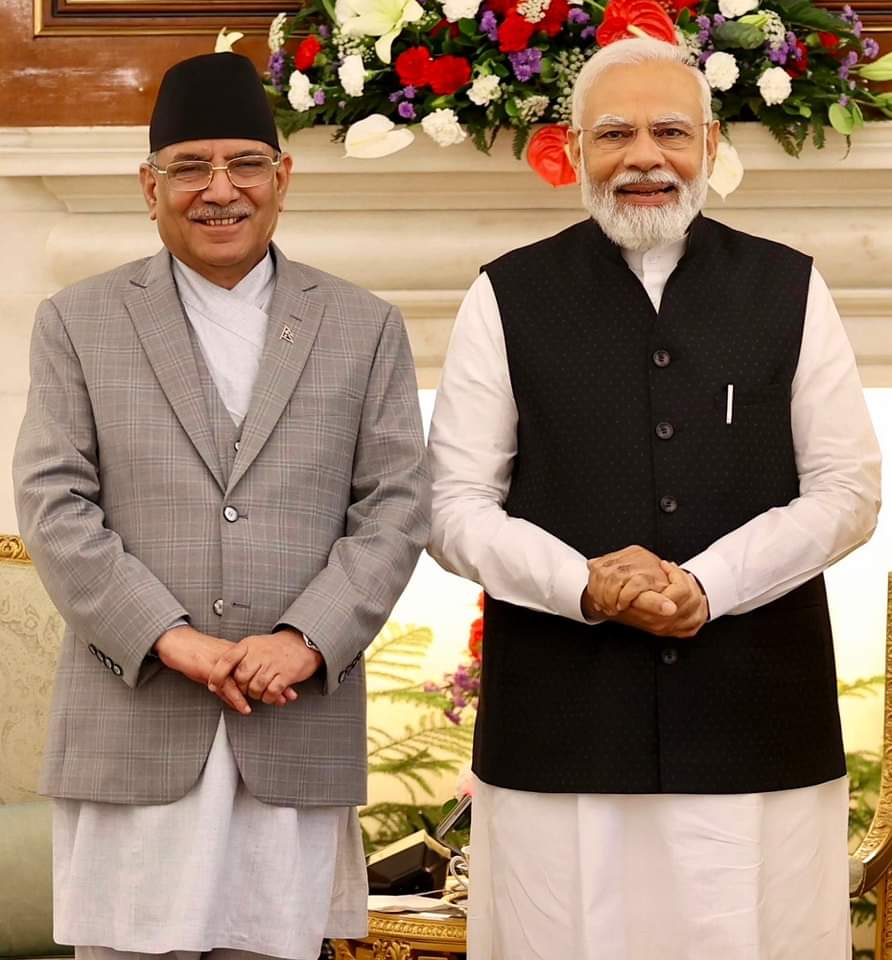

Nepal’s Prime Minister Pushpa Kamal Dahal (Left) with PM Narendra Modi met in New Delhi earlier this year.
Kathmandu: Porous border between Nepal and India is a key risk factor in the nexus to regional terrorism and terrorist financing activity though the Himalayan country has not experienced any acts of international terrorism in recent years, a regional body on anti-money laundering and terrorist financing said.
Asia Pacific Group on Monetary Laundering (APG), the anti-money laundering body representing the countries of Asia Pacific region, said in its mutual evaluation report about Nepal, released last week that Nepal may be used as a transit place or staging point for terrorists to hide, referring to some reports.
Referring to open source reports including the US State Department Report released in February 2023, the APG said regional foreign-backed religiously motivated extremist groups have recently increased their presence in Nepal, particularly along the India-Nepal border.
“These groups are not focused on Nepal. Nepali authorities acknowledge the challenge of the country’s porous border and the security threat it poses including in relation to terrorism and terrorism financing,” it said.
The report was adopted by the APG membership in July 2023 and contains a summary of the anti-money laundering and counter-terrorist financing measures in place in Nepal as at December 2022.
Mutual evaluation is a peer review process to examine whether any country complied with a number of standards set by the Financial Action Task Force (FATF) the global anti money laundering body.
The report has not named any terrorist organisations and individuals that could take advantage of the open border between Nepal and India. But neighbouring India often shows the risk of Pakistan-trained elements that could take advantage of the age-old tradition of open borders to harm India.
Cross border crime has also been a concern for Nepal too. Nepal has formal border security cooperation mechanisms with India to mitigate the risk arising from terrorists using Nepal as a transit or staging point for committing terrorist activities not targeted towards Nepal, the report says.
Considering the risk of cross-border criminal activities, Nepali experts have time and again called for regulating the border between the two nations to control cross border crimes.
Arun Subedi, who worked as foreign policy advisor to Former Nepali Prime Minister Sher Bahadur Deuba told the India Narrative that regulating borders was necessary to prevent infiltration of terrorists and criminals across the border.
“We have an open border with India. It does not mean it should be unregulated and unmanaged. It is also not in the spirit of Nepal-India Treaty of Peace and Friendship 1950,” he said, adding that treaty opened the door for cross-border movement of people without visa through designated routes.
But open borders have been a part of general lives for the people living across the border of both sides. Cross border marriage is an age-old tradition and people also make cross border movements for shopping and farming too. This relation is described as the relation of Roti and Beti and considered as unique in the world.
“There has never been a closed border between Nepal and India and open border has been a part of general lives of people residing across the border,” said Tula Narayan Sah, a researcher on Madhesi people, a community mostly living in southern bordering regions, told India Narrative. “Heading to a closed border could be unusual for many people, mainly Madhesi, who have lived in the environment of an open border and make their lives difficult.”
He said that despite potential risks, the porous border has not been the factor behind major terrorist activities in Nepal and India.
According to the APG report, Nepal’s counter-terrorism/insurgency strategies are focused on cooperation with neighbouring jurisdictions, primarily India.
“Nepal has a multi-level border security cooperation and coordination mechanism with India. The mechanism is used to combat border crimes including terrorism-related activities,” it said.
Though the APG pointed out the risk of a porous border, it says that Nepal is not identified as a major source or route jurisdiction for foreign terrorist fighters. “The Himalayan country is also not a high-risk jurisdiction for terrorist financing,” it says. “Nepal has not experienced any acts of international terrorism in the period under review (2022-23).”
India decisively asserted its military superiority over Pakistan during this month's brief but intense conflict,…
Trade associations and local business groups in Pakistan-occupied Gilgit-Baltistan (PoGB) launched an indefinite protest on…
A human chain and protest march was organized by various organizations in front of the…
The United States on Saturday announced the expansion of its security partnerships with India through…
Highlighting the use of indigenous platforms during Operation Sindoor, Chief of Defence Staff (CDS) General…
Congress MP Shashi Tharoor on Friday (local time) said that Colombia will issue a statement…